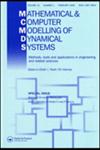基于正交多项式神经网络的非线性MIMO系统优化模型设计
IF 1.8
4区 数学
Q3 COMPUTER SCIENCE, INTERDISCIPLINARY APPLICATIONS
Mathematical and Computer Modelling of Dynamical Systems
Pub Date : 2021-01-02
DOI:10.1080/13873954.2021.1909069
引用次数: 3
摘要
本文提出了一种利用专门设计的正交多项式神经网络进行动态系统建模的新方法。这些网络利用正交函数构成的基可以用来逼近任意函数的特点,而它们的正交性使其在收敛时间和逼近误差方面都具有最佳性能。在这方面,广义拟正交多项式,专门为应用于具有时变行为的复杂动态系统的建模,被考虑。通过在正交基内使用可变因子来实现设计模型的自适应。将所设计的正交神经网络作为非线性多输入-多输出系统的代表,应用于实验室双转子气动系统的建模。对不同数量的多项式展开进行了详细的对比分析,目的是在模型精度和复杂度之间寻找最优模型。本文章由计算机程序翻译,如有差异,请以英文原文为准。
Designing optimal models of nonlinear MIMO systems based on orthogonal polynomial neural networks
ABSTRACT This paper presents a new method for modelling of dynamic systems by using specially designed orthogonal polynomial neural networks. These networks utilize the feature that the basis made of orthogonal functions can be used for approximation of arbitrary function, while their property of orthogonality enables optimal performances in the sense of both convergence time and approximation error. In this regard, generalized quasi-orthogonal polynomials, specifically tailored for the application in the modelling of complex dynamic systems with time-varying behaviour, are considered. Adaptivity of the designed model is achieved by using variable factors inside the orthogonal basis. The designed orthogonal neural network is applied in modelling of laboratory twin-rotor aero-dynamic system as a representative of nonlinear multiple input-multiple output systems. Detailed comparative analysis is performed for a different number of polynomials in expansion with the purpose of finding the optimal model in the sense of trade-off between model accuracy and complexity.
求助全文
通过发布文献求助,成功后即可免费获取论文全文。
去求助
来源期刊
CiteScore
3.80
自引率
5.30%
发文量
7
审稿时长
>12 weeks
期刊介绍:
Mathematical and Computer Modelling of Dynamical Systems (MCMDS) publishes high quality international research that presents new ideas and approaches in the derivation, simplification, and validation of models and sub-models of relevance to complex (real-world) dynamical systems.
The journal brings together engineers and scientists working in different areas of application and/or theory where researchers can learn about recent developments across engineering, environmental systems, and biotechnology amongst other fields. As MCMDS covers a wide range of application areas, papers aim to be accessible to readers who are not necessarily experts in the specific area of application.
MCMDS welcomes original articles on a range of topics including:
-methods of modelling and simulation-
automation of modelling-
qualitative and modular modelling-
data-based and learning-based modelling-
uncertainties and the effects of modelling errors on system performance-
application of modelling to complex real-world systems.

 求助内容:
求助内容: 应助结果提醒方式:
应助结果提醒方式:


